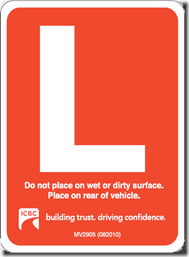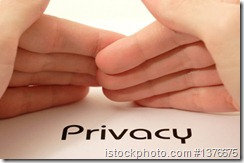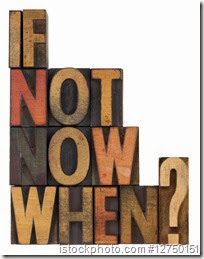Digital Drivers License
I remember when I was 15, quite some time ago, I bought a car. All my close guy friends were also buying cars. We worked on the engines, drive trains, electrical systems, etc. to get them into good working condition. We were allowed to drive them in the driveways to practice – back and forward. My dad would also let me drive his  car in the church parking lot when there were no other cars around. My dad formally taught me how to drive when I turned 16. I learned the rules of the road from a seasoned “expert” driver, wrote a test which I passed and then received my official drivers license. I was qualified to drive safely on the roads and highways. Following tradition, Shelley and I taught our three sons how to drive as well. Fast forward and kids still have to learn to drive from an expert – a parent or a professional – before they can take and pass a test to get their license. Historically this scenario repeated itself in all sorts of domains where parents / adults with expertise passed along their knowledge and wisdom to the upcoming generation.
car in the church parking lot when there were no other cars around. My dad formally taught me how to drive when I turned 16. I learned the rules of the road from a seasoned “expert” driver, wrote a test which I passed and then received my official drivers license. I was qualified to drive safely on the roads and highways. Following tradition, Shelley and I taught our three sons how to drive as well. Fast forward and kids still have to learn to drive from an expert – a parent or a professional – before they can take and pass a test to get their license. Historically this scenario repeated itself in all sorts of domains where parents / adults with expertise passed along their knowledge and wisdom to the upcoming generation.
Changing scenes, the Internet has snuck up and confused a generation. I’m glad my boys are past the teen years (we survived) but they didn’t have unfettered use of the Internet when they were growing up – we parents spent time learning the online world and guiding our boys – it wasn’t perfect but I believe it helped. Generally speaking, kids today know more about things digital than their parents and other adults do. Too many parents have no clue as to what their kids do online. They often think it’s too complicated to  figure out and often allow their children to go online unsupervised. Or, parents abdicate responsibility to schools. That would not be a wise move… teachers, all adults, are too often at a disadvantage in the digital realm in that they haven’t “lived” online enough to gain expertise and wisdom. I presented a session “Social Media Exposed” at the Richmond School District’s convention last Friday. We talked about the risks and dangers of unfettered use of social media by young people. This topic came up from a parent in a meeting in my District on Friday as well, asking what the District is doing to address digital citizenship needs. I think this is a need that is not well addressed by parents or schools and that both need to take responsibility for it, parents 24x7 and teachers/Principals while kids are in their care. There’s an educational component as well as a supervision requirement. We should want our kids to develop positive digital footprints as they navigate the online world.
figure out and often allow their children to go online unsupervised. Or, parents abdicate responsibility to schools. That would not be a wise move… teachers, all adults, are too often at a disadvantage in the digital realm in that they haven’t “lived” online enough to gain expertise and wisdom. I presented a session “Social Media Exposed” at the Richmond School District’s convention last Friday. We talked about the risks and dangers of unfettered use of social media by young people. This topic came up from a parent in a meeting in my District on Friday as well, asking what the District is doing to address digital citizenship needs. I think this is a need that is not well addressed by parents or schools and that both need to take responsibility for it, parents 24x7 and teachers/Principals while kids are in their care. There’s an educational component as well as a supervision requirement. We should want our kids to develop positive digital footprints as they navigate the online world.
How many parents do you know of that allow their young teens (or younger) to have a wireless device in their bedrooms? Remember, smartphones, iPod Touches, XBoxes, PS3s, etc. are all wireless devices that access the Internet. Your new Smart TV accesses the Internet. Access to the Internet is now pervasive and embedded in all sorts of devices. Who are your kids Skyping and Facebooking  with? How many parents are teaching their kids how to drive digitally? How many parents know enough about the digital realm to even know how to teach, guide, and supervise their kids use? I worry when parents tell me they don’t have a Facebook account and never will. Or, they have no experience with Pinterest, Twitter, Google+, Flickr, Skype, … <fill in your own> but have no problem with their kids using the Internet. What types personal privacy are your kids freely giving away online? Do you know?
with? How many parents are teaching their kids how to drive digitally? How many parents know enough about the digital realm to even know how to teach, guide, and supervise their kids use? I worry when parents tell me they don’t have a Facebook account and never will. Or, they have no experience with Pinterest, Twitter, Google+, Flickr, Skype, … <fill in your own> but have no problem with their kids using the Internet. What types personal privacy are your kids freely giving away online? Do you know?
On the other hand, there are many parents and teachers who fear letting kids use the Internet. This is nearly as bad as the former case. The Internet is a rich and valuable domain of knowledge, with connections to diverse peoples, engaging learning and entertaining experiences. It is neither evil nor is it good. It is a tool that will adapt to the people that use and contribute to it. To understand it a person must spend some time “living” there. As parents, we have an obligation to live online in the spaces our kids will go. And no, not having wireless or Internet in your home is not the answer. Banning its use is no different the the naïve approach used in the TV and video tape era – your kids will have access to the Internet via their friends homes and devices. Do you really want them doing so without your understanding and guidance?
I think we need a means to train kids in the ways of Internet to be safe, good online citizens, aware of the dangers and how to avoid them, how to avoid developing narcissistic behaviors, how to protect their privacy, how to behave properly, how to contribute productively to the global conversation, how to safely and appropriately network  with others, how to be entertained appropriately, etc. Kids need digital GPS’ to find their way safely. We need the social responsibility agenda to broaden and morph into a digital citizenship and social responsibility program. Perhaps a program could be instituted where kids are granted use of the digital world once they go through a comprehensive training program, pass a rigorous test, and be granted a digital drivers license. Perhaps school districts should take the lead in developing such an approach and ensure all of its staff also obtain digital drivers licenses. Or better yet, the province of BC should develop and provide this just as they do for cars!
with others, how to be entertained appropriately, etc. Kids need digital GPS’ to find their way safely. We need the social responsibility agenda to broaden and morph into a digital citizenship and social responsibility program. Perhaps a program could be instituted where kids are granted use of the digital world once they go through a comprehensive training program, pass a rigorous test, and be granted a digital drivers license. Perhaps school districts should take the lead in developing such an approach and ensure all of its staff also obtain digital drivers licenses. Or better yet, the province of BC should develop and provide this just as they do for cars!
What do you think about this idea? Am I being too conservative in my thinking here? How would you design and administer a digital drivers license program? What are you doing in your homes and schools?



Comments
Post a Comment